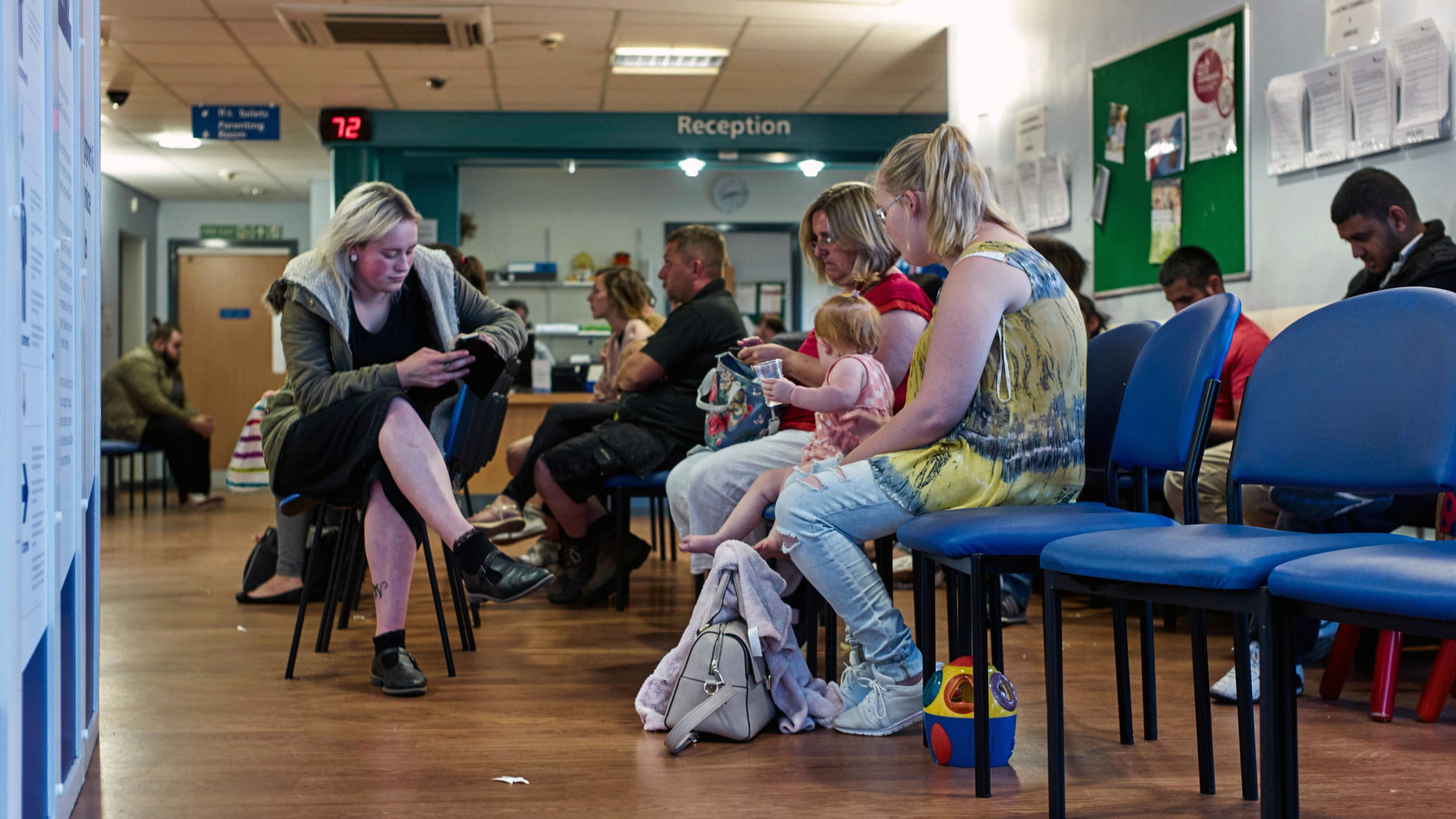In the UK, one profound question occupies the national consciousness more than any other: why can’t all the fat, lazy, poor people be as healthy and successful as rightwing political commentators? This essay is my earnest attempt to answer that question.
The link between social deprivation and poor health is well established. In the Middle Ages, kings generally outlived peasants – not because they jogged daily or counted calories, but because privilege trumps personal responsibility. While peasants broke their backs in the fields, subsisting on stale bread and turnip stew, kings feasted (gout be damned), slept in draughty but comparatively luxurious castles, and had physicians on hand – even if medieval medicine was little more than guesswork and leeches. Sure, royal life came with the occasional assassination attempt, but that beats dying from infected blisters or a bad harvest. Peasants, after all, faced famine, filthy living conditions, hard labour, and a healthcare system best described as “hope for the best”. So, before anyone claims good health is purely a matter of individual choices, remember: no amount of positive thinking or “pulling yourself up by your muddy bootstraps” could outpace the benefits of being born with a crown.
Several centuries later, still grappling with the puzzling phenomenon that wealthier people seemed to be living longer, more productive lives than the poors, we attempted to get to the bottom of the mystery once and for all. The 1980 Black Report, commissioned by Labour in 1977 to investigate health inequalities, revealed significant disparities in health outcomes across social classes. It stated: “Social class differences in mortality begin at birth. In 1971, neonatal death rates – deaths within the first month of life – were twice as high for the children of fathers in social class V as they were in social class I.” The Thatcher government didn’t appreciate this, as it jarred somewhat with its emerging neoliberal critique of the post-war consensus. Naturally, the Iron Lady’s acolytes suppressed the report’s findings, dismissing Sir Douglas Black’s recommendations to address social inequalities in health through improved child benefits, housing, and labour conditions. Despite clear evidence and repeated warnings, successive governments have ignored the consequences. Today, this neglect manifests in widespread public health crises driven by poverty and inequality, exacerbated by a healthcare system unfit for modern needs.
For those insulated from social inequality – living in secure, dual-income households with access to top schools – the dire health picture for the poor is barely visible. This detachment fosters the illusion that social mobility is a result of personal merit rather than structural advantage: another consequence of Thatcher’s ultimate victory. Favourable conditions in education, health and employment are mistaken for individual success rather than systemic privilege. While lifestyle choices matter, they are shaped by the options available. To live in a deprived community is to lack the resources and opportunities of affluent areas.
The Covid-19 pandemic exposed these stark inequalities. Those in poverty before the virus were the most vulnerable. Longstanding disparities in health, housing, employment and public trust drove higher infection and mortality rates in poorer areas. Of course, this stark reminder of the true impact of these historic inequalities was relegated in political discourse, where debates about how many unproductive elderly people the virus might kill off, or whether the virus was even dangerous, took centre stage. In a post-Covid world, accessing healthcare feels like navigating an obstacle course – something we’d rather avoid unless absolutely necessary. Today, falling ill doesn’t just mean dealing with pain, distress or anxiety. It also brings a sense of dread at the prospect of engaging with the NHS. Making a GP appointment or visiting A&E has become more arduous and time-consuming than most of us can remember.
One disastrous result of this has been the utter abandonment of continuity of care – a sense of familiarity that improves the quality of medical encounters, and an essential principle of world-leading healthcare. Strong word of mouth once reinforced trust in local health services: if you needed help, someone would be there. A functioning healthcare system depends on more than just clinical resources. People must believe their health is worth taking seriously and trust that, if they seek care, it will be available. Sadly, that is no longer the case. In fact, it’s likely that the only reason the system hasn’t collapsed is that so many people choose to avoid it. If everyone who needed a GP appointment booked one tomorrow, the system would grind to a halt.
Avoiding GP surgeries has become a legitimate strategy, with patients waiting until after-hours to call NHS 24, where they are at least guaranteed to speak to someone that day – despite that not being its intended purpose. Many now delay or abandon the idea of seeking medical attention for minor aches, pains and discomforts. They feel like a burden, lack the time, or simply can’t face the stress of trying to be heard. Over time, these untreated issues compound into serious health conditions. The early warning signs a GP might use to detect diseases like cancer are missed. On a larger scale, this crisis manifests in grim statistics – rising numbers of younger people living with or dying from cancer. It fosters doubt, scepticism, and even apathy toward our own health. A toxic fatalism takes root: if people with life-threatening conditions are waiting too long for treatment, what chance do the rest of us have?
Despite needing more care, poorer patients receive less. Healthcare funding is systematically skewed in favour of wealthier areas, where residents experience fewer and less complex health issues. This is the "inverse care law", first articulated by Julian Tudor Hart in 1971: access to good healthcare is inversely proportional to the need for it – the sicker you are, the less likely you are to receive adequate treatment. This plays out daily in GP surgeries across the country. In affluent areas, doctors have longer consultation times, fewer chronically ill patients, and better-resourced practices. In poorer areas, GPs are overwhelmed and underfunded, forced to make impossible choices with limited resources. On paper, the difference in consultation times may seem minor – just seconds – but in practice, it means the difference between thorough care and rushed decisions. Complex health issues demand time and attention that overstretched doctors simply don’t have – and let’s not get started on the receptionists.
In Britain’s poorest communities, poor health isn’t an anomaly – it’s an expectation, woven into daily life. Multimorbidity – once associated with old age – is now common among younger generations in these areas. Chronic conditions like heart disease, respiratory disorders, diabetes, and mobility impairments don’t exist in isolation but in devastating combinations, slashing both lifespan and quality of life. This, of course, has everything to do with poor people making dumb choices, and nothing at all to do with the fact you can now get a McDonald’s delivered directly into your face at any time of the day or night. Contrast this with wealthier areas, where florists, and fruit and veg shops dominate main streets, often flanked by wide-open, well-maintained greenspaces, and you begin to see what deprived communities are being deprived of.
Doctors working in deprived communities witness these realities daily. GPs have described to me patients who, faced with the choice between making drastic lifestyle changes or continuing as they are, often opt for the latter – not out of ignorance, but resignation. This isn’t recklessness; it’s a rational response to a system that has failed them repeatedly. Lifestyle choices don’t happen in a vacuum. Stress, food insecurity, air pollution and substandard housing all shape health outcomes in ways that individual willpower alone cannot overcome.
The failure of the system isn’t just about funding; it’s about political will. The NHS alone cannot solve health inequalities, because these disparities are rooted in broader social issues. Investment in early intervention and preventative healthcare, particularly in the most deprived areas, remains grossly inadequate. Addressing poverty- related health disparities requires a fundamental shift – viewing healthcare not as a reactive service for the sick, but as part of an integrated social support system designed to promote community wellbeing, harmony and, of course, economic productivity.
For Britain’s poor, healthcare isn’t just inadequate – it’s increasingly privatised by stealth. As GP services become harder to access, people turn to pharmacies, where over-the-counter painkillers, sedatives, and cough syrups with addictive potential are readily available. Many self-medicate, leading to rising rates of substance dependency. Painkillers mask undiagnosed conditions until they reach crisis levels. Toothaches become abscesses requiring emergency surgery. Suspicious lumps go unchecked until they are terminal. Mental health struggles, left untreated, spiral into addiction, suicide and preventable deaths. This is not a functioning public health system – it is a lottery rigged against the poor.
Britain’s drug crisis is not just about illicit substances – it is a direct consequence of medical failures and policy missteps that have exacerbated addiction among the working class. The over-prescription of opioids in the 1990s and 2000s fuelled an epidemic of dependency, mirroring the crisis in the US. Chronic pain, often the result of physical labour, was treated with powerful opioids without sufficient oversight. When the scale of the problem became undeniable, the NHS responded, beginning in 2019, with sweeping restrictions, cutting patients off without adequate support.
At the same time, benzodiazepines – commonly prescribed for anxiety, trauma and sleep disorders – were also heavily restricted. For many struggling with untreated mental health conditions linked to poverty, these medications had become a lifeline. Their abrupt withdrawal forced thousands toward illicit alternatives, including street benzodiazepines and heroin, with often deadly consequences. Lacking a robust national response to the evolving drug crisis, the system fails those most in need. Instead of being treated as patients requiring care, those battling substance dependency are criminalised, abandoned, or pushed into unsafe drug markets.
People suffering from addiction in Britain’s most deprived areas are treated as second-class citizens within the NHS. They have little say in their treatment, often placed on methadone maintenance programs with no clear pathway to rehabilitation. Addiction (like most other poverty-related health problems) is still framed as a personal failing rather than a complex medical and social issue. This moralistic stance ignores the systemic factors driving drug dependency: poverty, childhood trauma, inadequate housing, and a lack of mental health support. And that’s before even considering social security.
For those in deprived communities, health problems come with an added burden – an overly punitive welfare system that prioritises rooting out fraud over ensuring people receive the support they are legally entitled to. Rather than acting as a safety net, the welfare system has become an obstacle course, where legitimate claims are frequently denied as a cost-cutting strategy – mirroring the tactics of private health insurers in the US. Instead of providing financial assistance to those in need, the system is designed to delay and reject claims, trapping individuals in cycles of stress, debt and worsening health.
Government crackdowns on benefit fraud have long been more about political messaging than meaningful reform. Despite fraud making up only a small fraction of overall welfare spending, successive governments have introduced increasingly harsh measures to monitor and penalise claimants. Enhanced powers to scrutinise bank accounts and social media profiles, coupled with severe penalties for minor administrative errors, reflect a “politics before policy” approach. These measures are designed to project a government that is “tough” on welfare – even at the cost of pushing already vulnerable people deeper into hardship.
This punitive approach is counterproductive, particularly given the government’s stated aim of getting people back to work. Chronic stress, financial insecurity, and the constant threat of losing vital support create conditions that worsen health and make it even harder for people to re-enter the workforce. For women, the stakes are even higher. Economic dependence can trap them in abusive relationships, while repeated interactions with an unsympathetic welfare bureaucracy retraumatise survivors of violence.
Rather than helping individuals regain stability, the system entrenches precarity, making it harder for people to recover and contribute to society. A welfare state that punishes rather than supports is not just cruel – it is economically short-sighted, entrenching poverty and ill health while failing to achieve its own goals.
Beyond hospitals and GP surgeries, the environment itself makes people sick. In the poorest communities, urban decay is ever-present. Abandoned buildings, derelict lots, and neglected infrastructure contribute to mental illness and reinforce cycles of despair. When every street you walk down reminds you that no one cares, it’s easy to believe that that includes your doctor, your government, even yourself. Just as buildings must meet basic safety regulations to be classed as habitable – a home must have a bathroom, doors and windows – we must rethink how communities are designed, based on what human beings need to thrive.
Right now, the forces shaping our neighbourhoods often run counter to public health, dictated by market forces that aggravate the principle of the inverse care law. That is to say, deprived communities become unhealthier wherever commercial incentives are allowed to run rampant. When supermarkets and property developers are being given more input on how development in a community unfolds while local authorities are in a state of managed decline, is it any wonder that so many people live in food deserts, surrounded by off-licenses masquerading as groceries, with five bookies to every GP, and an illicit drug market that can deliver to your door faster than Dominos?
Health inequality in Britain is not a failure of knowledge; it is a failure of political will. Every government has understood the stakes. Every government has chosen to maintain the status quo. Reallocating healthcare resources to favour the most deprived areas would mean taking from wealthier ones – an electoral risk few politicians are willing to take.
Internationally, progressive policies have demonstrated the potential for change. Denmark integrates elderly housing with young families, fostering intergenerational support. Norway treats addiction as a public health issue rather than a criminal offence, leading to lower recidivism rates for drug-related crime. Finland prioritises equality and wellbeing in its social policies, correlating directly with better health outcomes. Strategies like universal basic income, free school meals for all children, and subsidised mental health care are widely recognised as effective in reducing inequality. Yet Britain remains trapped in a cycle of short-term policy decisions, cultural division and systemic neglect. Basic issues like cycle-lanes, needle exchanges, and policies that promote work-life balance and gender equality generate days of online debate here, while in most European countries of comparative wealth, these are settled issues. Is it any wonder we are being out-performed on every metric except inequality, where we consistently top the league? As inequality deepens, those in the poorest communities grow increasingly distrustful of institutions, leading to disengagement from healthcare altogether. This accelerates the inverse care law: those most in need become the most distant from care.
True healthcare reform requires more than just increased funding. It demands a proactive model, where health is monitored over lifetimes to detect problems before they arise. Community environments must also be redesigned to support wellbeing, integrating what we know about human health into urban planning, housing, and employment policies. A truly effective healthcare system cannot focus solely on treating individuals at the point of need. It must also address the conditions that make people sick in the first place.
So how do we move forward? Some argue we require an insurance-based system to meet the level of demand for better services. Others believe we just need to keep pouring money into the NHS and that anything approaching reform is akin to backdoor privatisation. In this polarised and highly ideological debate, we’ll get nowhere fast. In truth, a large part of the solution lies not in the health service but in the wider inequalities outlined earlier. The Health Equals campaign, launched by the Health Foundation in 2024, seeks to tackle these structural inequalities by drawing attention to the broader social and economic forces that shape health. It challenges the notion that healthcare alone determines health outcomes, emphasising how education, housing, income, job security and access to green spaces directly impact wellbeing.
At its core, Health Equals calls for systemic change that extends beyond the NHS. It advocates for policies that improve living conditions and remove the structural barriers that lead to poorer health in disadvantaged communities. A coalition of organisations – including Shelter, the Joseph Rowntree Foundation, Trussell, Barnardo’s, and Citizens Advice – supports the campaign. With expertise in housing, poverty alleviation, food insecurity, and social justice, these groups reinforce the campaign’s core argument: health is shaped by the conditions in which people live and work. This campaign matters because it shifts the conversation from personal responsibility to societal responsibility, and from inequality to fairness. By advocating for fairer policies and greater investment in the social determinants of health, the campaign seeks to prevent illness before it arises – ultimately reducing strain on the NHS and improving life expectancy and quality of life for marginalised groups. It’s a campaign I support because it focuses on measures well within the legislative competence of any government, provided they are willing to show leadership and place policy before politics.
Without a paradigm shift, Britain’s poorest will remain condemned to shorter, sicker lives. The burden of ill health falls disproportionately on the working class and economically disadvantaged – not because of personal failure, but because of structural injustices. Until policymakers take responsibility for the structural determinants of health, these inequalities will persist. The question is not whether we can afford to address these injustices, but whether we can afford not to. The longer these disparities go unaddressed, the higher the societal cost – not just in healthcare spending, but in human and economic potential lost to preventable disease and premature death. If growth is the number one priority of government, then a healthy workforce is required to drive it. Perhaps, instead of turning the Department for Work and Pensions into a low-rent FBI, snooping on bank accounts, performing dawn raids on suspected fraudsters, we might deploy resources making sure people get the help they need so they can return to work, healthier, happier and more productive.
The suppression of the Black Report 40 years ago may feel like a distant memory to many, but it remains a stark reminder of how long these issues have been ignored. Like a niggling health issue that goes unaddressed, one day the symptoms we’ve tried to ignore or minimise will simply overwhelm us. What should worry all of us is just how adjusted those in most need have become to this dangerously imbalanced health status quo, and how this low expectation lets politicians off the hook. But perhaps the most shocking aspect in the ongoing public health debate, so often centred around notions of individual responsibility rather than systems that demonstrably favour wealthier citizens, is how distant most people remain from the ugly, irrefutable truth: poor health is absolutely a choice – a political one.
All donations go towards supporting the Bee’s mission to nurture, publish promote and pay for the best new working-class writing.









Comments